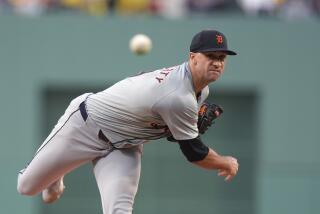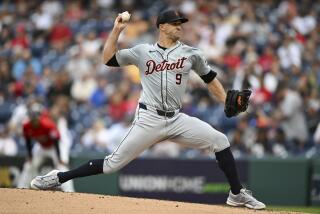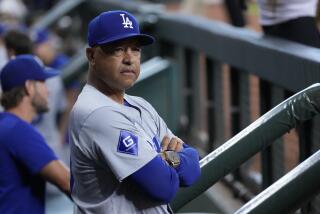Labor Uncertainty Kept Things Quiet
Reflecting the economic climate and fear of a work stoppage, the final hours of baseball’s nonwaiver trade deadline failed to generate the usual swap meet.
The deadline came and went Wednesday, with the Angels’ low-grade acquisition of journeyman Milwaukee outfielder Alex Ochoa the highlight, unless you’re intrigued by the San Diego Padres cornering the market on pitchers named Jones, reuniting the former New York Mets, Bobby J. and Bobby M. Jones, in a deal that sent reliever Steve Reed to New York for Bobby M.
Yes, there were a few others.
The Mets traded center fielder Jay Payton to Colorado, the Rockies dealt former Dodger Todd Hollandsworth to Texas and Boston acquired reliever Bobby Howry from the Chicago White Sox, but that was it.
A total of five trades, not the kind of big-name, fast-paced action usually associated with a trade deadline day.
This is meant as no disrespect to any of the involved players, particularly Ochoa, who provides Manager Mike Scioscia with the right-handed-hitting outfielder he wanted on the bench, if leaving General Manager Bill Stoneman vulnerable to criticism for failing to improve a bullpen that has only one left-hander and apparently will rely heavily on the comparatively untested Brendan Donnelly, Scot Shields and Ben Weber down the stretch.
Of course, several big-name players had been traded already, including Scott Rolen, Cliff Floyd, Bartolo Colon, Raul Mondesi, Ray Durham and Kenny Lofton, but Wednesday’s comparative calm may have had more to do with widespread payroll restraints and a feeling among many clubs that there was no sense trading a package of prospects for a high-salaried player when the season may end at any time after mid-August.
Some general managers reached Wednesday disagreed, but one said: “I don’t think there’s any question but that the labor situation scared off some clubs.... There’s not a lot of clubs willing to take on salary, and the labor uncertainty compounds that. If the labor is resolved quickly, you might see more trades than usual before the
31st.”
He referred to Aug. 31. Any player acquired before then is eligible for the postseason, but he would have to clear waivers before joining another club.
Who have been the winners and losers to this point?
Winners
* St. Louis Cardinals (Acquired Rolen and Chuck Finley): A happy Rolen adds right-handed balance to the middle of an impressive lineup, enables Albert Pujols to stay in left field and gives the Cardinals six defenders of Gold Glove caliber. A good trade becomes a great trade if the Cardinals can re-sign the free agent-eligible Rolen to a multiyear contract, but that shouldn’t be a problem. Rolen wants to play in the Midwest, and players are generally quick to sign--Mark McGwire and Jim Edmonds, for example--once they get a view of the red army in Busch Stadium. Finley is in the twilight of a resilient career, but he adds a healthy arm to a rotation traumatized by injuries and the death of Darryl Kile.
* Boston Red Sox (Acquired Cliff Floyd, Alan Embree and Howry): The Red Sox didn’t land a starting pitcher, but they enhanced a suspect bullpen with Embree and Howry and filled a void behind Nomar Garciaparra and Manny Ramirez with Floyd. The latter failed to fulfill expectations in his brief return to Montreal and now must quickly adjust to a new league, but he should, at least, give pitchers pause as they work through the middle of the Boston lineup. Equally important, perhaps, the Red Sox prevented the dreaded and voracious New York Yankees from landing him.
* Dodgers (Acquired Tyler Houston and Paul Shuey): Determined to justify a $105-million payroll and end their playoff drought, the Dodgers filled two immediate needs. It’s all about this year and next, when the Dodgers can begin unloading a few of their biggest and most restrictive contracts. However, it may take longer to evaluate the two trades. The Dodgers gave up pitcher Ben Diggins, Kevin Malone’s No. 1 draft choice of 2000, in the Houston trade, and pitcher Ricardo Rodriguez, their No. 1 prospect, according to Baseball America, in the Shuey trade. A still-thin farm system got thinner, but others clearly evaluated the two pitchers higher than the Dodgers’ current regime, and both will be forgotten if the Dodgers are still playing in October.
* Yankees (Acquired Jeff Weaver and Mondesi): With a payroll of $135 million and counting, the rich get richer and the players’ union, knowing who drives the salary market, continues its fight to protect Yankee resources. Although Weaver has been hit hard in four starts with New York and outpitched by Ted Lilly, who went from the Bronx to Oakland in that three-way trade, he represents a sound, 26-year-old arm in a rotation handicapped by injury and age, and his promise can be measured by the fact that he was probably the market’s most pursued pitcher before traded to the Yankees. Mondesi tends to punch his own time clock, but he still brings considerable talent to right field, and the framework of the Yankee clubhouse should help provide a definition of focus--if anything ever does.
Losers
* Philadelphia: The Phillies might have done better with a Cincinnati offer of third base prospect Brandon Larson and relief pitcher Scott Williamson for Rolen, but Reds’ owner Carl Lindner is said to have withdrawn it amid concern over a strike beginning Aug. 16. The Phillies also might have done better trading Rolen last winter, once he had rejected their $140-million offer, but they took a chance that they could win with him, building on their second-place division finish of last year. Ultimately, as Rolen feuded with fans, manager and front office, questioning the overall commitment to winning as Curt Schilling did before him, the Phillies had to get what they could, which wasn’t much, under duress: a quality utility player in Placido Polanco, an inconsistent reliever in Mike Timlin (whom they have been trying to trade) and starter Bud Smith, who had disappointed the Cardinals with his performance and work ethic after a promising debut last year.
* White Sox: Flattened by Minnesota in the American League Central, the White Sox have embarked on an unexpected overhaul, trading Durham, Howry, Lofton and Sandy Alomar Jr. for a lot of young players and the uncertainty that goes with them. They would love to defuse a combustible clubhouse by trading Frank Thomas, but his value has taken a bigger beating than even his team has.
* Cleveland: The Indians, at least, knew from the start they were in for an overhaul, and now Finley, Colon and Shuey have joined the previously departed Roberto Alomar, Juan Gonzalez and Lofton. The rebuilding project will need at least two years to sort out and would have been more extensive if Cleveland had found takers for the high-salaried Omar Vizquel and Ellis Burks. Give Jim Thome credit for retaining his affection for the city and refusing to waive his no-trade clause for any suitor. He will be the bridge between the old and new Indians.
More to Read
Go beyond the scoreboard
Get the latest on L.A.'s teams in the daily Sports Report newsletter.
You may occasionally receive promotional content from the Los Angeles Times.





